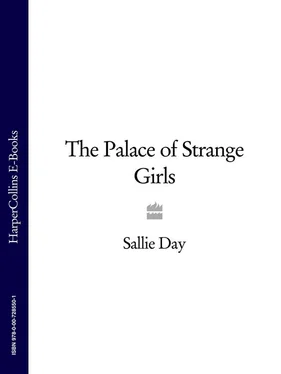Though barely topping five foot six, Ruth appears much larger. Her face is scrubbed to a shine and her brown hair (already falling victim to the stealthy approach of grey) is brushed and fixed neatly into a Victory Roll that evokes memories of the war years and oppressive rationing. She is an energetic woman. A woman devoted to hard work. A woman reliant upon the writings of Elizabeth Craig to guide her through the minefield of domestic practice. Once in the room, Ruth dumps the clothes on the nearest bed and heads straight for the window to let in the sunshine. This involves coaxing, flicking, tugging and hauling the pea-green damask curtains to either end of a buckled and sagging wire. Halfway through this daily ordeal Ruth is distracted by the sight of the hotel yard, four floors below. It is lined with overflowing bins and a miscellaneous collection of mops, buckets and rusty chairs occupied by members of the hotel staff during their tea breaks. There, in full view, stands a line of sullen grey dustbins on an island of cracked concrete; the whole amply irrigated by the backwash of overflowing kitchen drains. Ruth’s whitewashed backyard boasts two bins, double the capacity of her terraced neighbours’. One (supplied by the local council) for ashes, and the other (privately purchased) for household waste. Ruth always wraps potato peelings and the like before disposal. Only by wrapping everything in fresh newspaper can Ruth ensure that the inside of her bin remains as clean as the day she bought it.
The sight of the hotel bins is aggravated further by the appearance of two overturned buckets that roll back and forth as the wind shifts. Surely the hotel owns more by way of cleaning equipment than that? Ruth has a whole selection of buckets in her backyard. One for gathering up the hot ashes from the kitchen fire, one for scrubbing floors, another for washing windows and, finally, a monstrous aluminium bucket, twice the size of its iron counterparts, for ‘best’. In line with its elevated status this bucket stands in glorious isolation in the scullery, immaculately clean and gleaming with potential, waiting for the next load of cottons that need starching.
Ruth’s ruminations on household equipment are interrupted by a cry of protest from her older daughter: ‘Isn’t it time I changed my skirt, Mum?’
Ruth turns her gaze from the window. ‘I don’t know what you’re fussing about. That skirt will do another day. You’ve got clean underwear. You wouldn’t have that if I hadn’t spent half an hour in the laundry room last night.’
This is not quite the irksome job it might appear. The hotel laundry room houses a brand-new Bendix Twin Tub. Under the pretext of hand-washing the family’s underwear, Ruth has admired the top-loader lids and neat hoses on the twin tub, seen the spinner in action. As the adverts say: ‘This is the future of household laundry.’ Ruth has a Hotpoint Empress at home. With its built-in ‘automatic’ wringer and Bakelite agitator it used to be the last word in laundry. But the advent of the Bendix Twin Tub has changed all that. Who would want the backache of hauling double sheets through the wringer if they could drop them in a spinner and pull them out forty minutes later drip free? This is the modern world of post-war Britain. A world made familiar to Ruth through magazines. A world she is determined to enter.
Ruth turns her attention to her younger daughter. ‘Have you washed your face, Elizabeth? Elizabeth!’
Beth has her head firmly in the I-Spy codebook. She is practising stroking her cheek in the manner prescribed at the beginning of chapter 3 ‘Greeting other Redskins’. Beth has been rehearsing this move for the past four days but no one has yet responded.
‘Elizabeth!’ Ruth says, taking her daughter firmly by the arm. ‘Are you listening? Have you washed your face?’
‘Yes.’ It is a small lie. So small that it barely deserves the name. But it affords a morsel of revenge, a minor victory in the guerrilla war Beth has been waging since Easter, a war that Ruth is only dimly aware is being fought.
‘Looks more like a lick and a promise to me,’ Ruth says, scanning her daughter’s face. ‘You could do with using a bit of soap next time.’
‘Can I have a summer dress today? Please. I hate wearing shorts. I look like a boy in them.’
Ruth holds up the brown shorts. The weave is a right-hand twill, perfect for rough wear because it will resist snags and tears. And it won’t wear out. ‘Well, if these shorts and those sandals aren’t summery I don’t know what is,’ she says. ‘I’ve only brought your jumper because we’ve got to keep you warm.’
‘Can I wear this?’ Beth asks as she pulls a smocked cotton dress from the bottom of the pile. Beth has inherited the dress from her sister but has yet to be allowed to wear it.
Ruth holds up the dress. ‘It might do,’ she concedes. There follow a frantic ten minutes while Ruth tries and fails to fit the dress over Beth’s wool vest and fleece-lined liberty bodice. ‘It’s no good, Elizabeth. It’s not going to fit. Hold your arms up while I get it off.’
Beth raises her arms as the dress is pulled up over her head, bringing the vest and liberty bodice with it. By the time Beth emerges from the struggle her face is the colour of the rising sun – for a minute she looks healthy. In her haste to protect her daughter from any potential draughts Ruth yanks the vest back across Beth’s skin so sharply that the child flinches with pain. In another moment she is dressed in the prescribed brown knee-length shorts, olive-green jumper and thick socks to take up the slack in her sandals.
‘There. Now you’re done.’ Ruth heaves a sigh with the effort involved in arming her daughter against all the sharp winds and torrential rain that Blackpool can offer in the middle of July.
RED-EYED SANDHOPPER
These little animals live between the tidemarks, chiefly under stones and in the rotting seaweed at the top of the beach. They are white with bright-red eyes and five pairs of legs. Score 10 points for a bleary-eyed sandhopper.
Jack has escaped early to buy a newspaper. With this end in mind he has made his way to the promenade in holiday mood. The sun is still a bit fitful but the air is fresh. He is easily tempted by the sea and so wanders over the tram tracks and pink tarmac to the edge of the promenade, takes a deep breath and gazes over the railings. The run-up to the annual Wakes Week holiday has been hectic. The weaving shed where Jack is foreman has been buzzing with talk of closure. Jack has spent the last week sorting out one problem after another, reorganising shifts, dealing with strike threats and all the while continuing the daily struggle to keep output steady. Jack takes another deep breath and, determined to relax, gazes out to the horizon. The tide is coming in and the remaining strip of sand is empty save for a single figure, shoes in hand, making its way painfully over sand hard rippled by the tide. It’s Dougie.
‘Mornin’, Dougie! Up an’ at it already?’ Jack shouts.
The figure looks up and glares. Dougie Fairbrother is knee high to a grasshopper and walks like he’s fighting a gale. When he comes within hailing distance he yells, ‘What time is it, Jack?’
‘Just comin’ up to twenty past.’
‘What?’ Receiving no immediate reply, he adds, ‘Twenty past what?’
‘Seven.’
‘That means I’ve been on this friggin’ beach for the best part of two bloody hours,’ Dougie says as he makes his way slowly up the concrete steps that separate the beach from the prom. Jack shakes his head. He has known Dougie Fairbrother all his life. Jack was the first person Dougie went to when his wife walked out and it was Jack who got him sorted out with a solicitor. Dougie has developed a fair thirst since his divorce back in the spring. It’s eight in the morning and he’s still drunk from the night before. When Dougie finally reaches the top of the steps he stops to catch his breath. Dougie has worked in the weaving shed since he was fourteen, that’s the best part of twenty years filling his lungs with lint and dust.
Читать дальше












